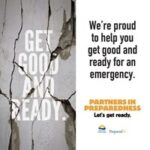Preparing 72 Hour Emergency Kits
According to the Government of Canada, in the case of emergency preparedness you need to be prepared to get by without water or electrical power for 72 hours. That is 3 days, in case your math is rusty. While you can find plenty of lists that give you the ins and the outs of preparing a 72 hour survival kit, there are some things these lists won’t tell you.
- You need to get a duffle bag or backpack for each person in your household that they will be able to carry while running. Also make sure the bags can be carried by each person. Obviously you don’t want to leave your five-year-old carrying a bag three times her size. The premise is that in certain emergencies, such as a fire or flood, you’ll want to get out of Dodge and you’ll need to take 72 hours’ worth of supplies with you.
- Save the canned goods in your storm shelter. You won’t get too far with a bag loaded with canned peas weighing you down, so opt for lighter weight goods. Look for freeze-dried food packages and powdered drink mixes, and save the heft of your bag for the bottles of water.
- Speaking of bottled water, this is perhaps the most important thing you should have tucked safely in your 72 hour emergency kit. According to FEMA, you’ll need to have “one gallon of water per person per day for at least three days, for drinking and sanitation.” Even more importantly, you want to keep your bottled water maintained. Wouldn’t it be a disaster to grab your emergency kit in the case of a flood, only to find out that all of your bottled water had joined the flooding waters thanks to a bottle burst from frozen water? Also, you don’t want to find yourself drinking stagnant water, so keep your water supplies fresh. Check your water supply monthly, or weekly during times of bad weather and social distress.
- There are certain cases that call for special items. Do you have a baby in tow? Not only will he or she not be able to carry a bag, they’ll also require an additional bag filled entirely with their own supplies. The FEMA’s READY program suggests having a duffel bag stuffed with items you’d typically carry in your baby’s diaper bag. However, as babies grow at a substantial rate, their 72 hour emergency kit will need to be checked weekly. Keep in mind that baby formula and jarred foods will need to be checked and replaced just as often to prevent spoilage.
- Finally, consider the climate that you live in. Do you have short summers and harsh winters, or are you living in a tropical climate? You should pack three days’ worth of clothing according to the current weather conditions. Therefore you’ll need to change the clothes in your kit every 3 months or when the seasons change.
Packing a 72 hour emergency kit is a no-brainer if you want to survive in most emergencies. However, thinking outside the box will separate the men from the boys. So consider personalizing your kit with items of great reward, such as family photos or mp3 players, which can help your family members keep their sanity in times of distress.






